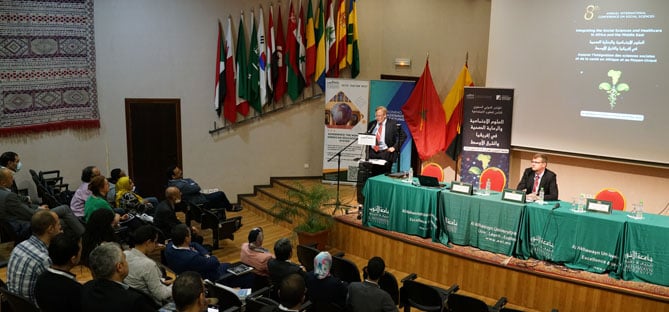
Al Akhawayn University and Konrad-Adenauer-Stiftung Institute partnered to organize the 8th edition of the Annual International Conference on Social Sciences under the theme, "Ensuring the integration of social sciences and healthcare in Africa and the Middle East," to discuss a common vision on the role of social sciences in the healthcare system.
Al Akhawayn University, as an active player engaged in the promotion of scientific research, constructive public debate, and social inclusion, has been organizing this annual conference every year since 2014, with the aim at providing a space for strategic reflection on the social, economic, and political issues that the continent faces.
COVID-19 has highlighted the importance of healthcare in public policy. Healthcare is a complex issue that has links to government policy, representations, infrastructure, social movements, education, communication, finance, training, licensing, and insurance.
Despite ongoing debates and controversies, the healthcare field remains understudied from a social science point of view in Morocco and other African and Middle Eastern states. Organizing Healthcare is a challenge for far wealthier states, even when fundamental political questions, such as whether it is a right or not, are posed. For example, as a middle-income country, Morocco has faced significant challenges in terms of actualizing the constitutional right to healthcare under Article 31 of the 2011 constitution.
The eighth edition of the Annual International Conference aimed to create a forum where researchers from the social sciences can present their studies of healthcare in an interdisciplinary context with the hope to spark conversations about where to go with healthcare in Morocco. The Conference was chaired by Dr. Christopher Taylor, Vice-President in charge of Academic Affairs and Dean of the Faculty of Humanities and Social Sciences (SHSS) of Al Akhawayn University, and Mr. Steffen Kruger, Resident Representative in Morocco of Konrad Adenauer Stiftung.
Timothy Loh, socio-cultural anthropologist at Massachusetts Institute of Technology, focused on the provision of hearing technologies, mainly the cochlear implant to deaf Jordanians as forms and practices of care. He argues that these technologies are important for development by providing access to speech and presumably better integration into society—but also problematic socio-politically—in diminishing their sense of belonging to broader deaf collectivities.
For his part, Dr. Reda Sadiki, doctor, and author, explained during his speech how, far from the myth of apolitical, neutral, and objective science, medicine has been a powerful instrument of colonization and domination. He highlighted why it is necessary today to understand the systemic logic of the colonial heritage, often veiled by new, partial, and seemingly isolated facts.
Thus, several scientific issues were discussed during this edition, including health policies, global health, COVID-19 containment, healthcare access, gender, medical education, pediatric health, mental health, medical communication, palliative care, sexual and reproductive health, medical tourism, history of health care, cannabis legalization, etc.
